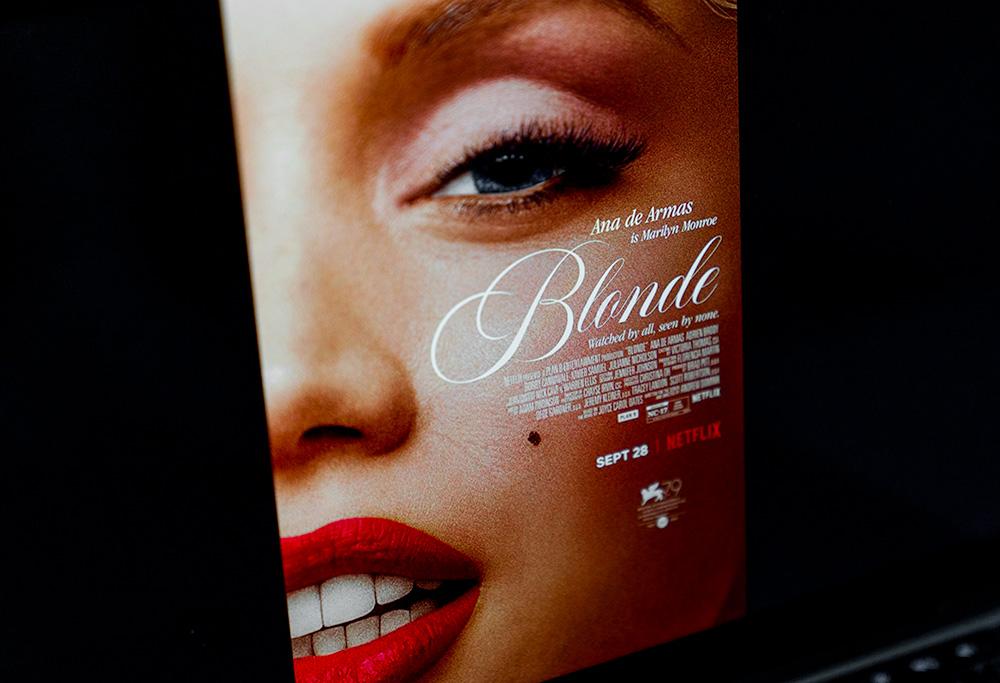I spent two hours and 47 minutes of my life watching a movie that was supposed to be about Marilyn Monroe. I regretted every minute of it.
Directed by Australian filmmaker Andrew Dominik and starring Ana de Armas — best known for “Knives Out” — the film

The most concerning part of this movie is that most of the scenes used to portray this star are entirely fabricated. I was unaware of the movie’s fictional aspects until I started researching it. Turns out the film is not a biopic, but is based on a fictional book, “Blonde,” by Joyce Carol Oates. They are profiting off of a dead woman and not using actual real events. This is the first red flag of many that came from this film.
I don’t know if I can defend the acting of de Armas as Monroe. In the movie, she was a used and easily manipulated woman. I’m sure de Armas would have been able to do an excellent job had the script been better.
The film starts with Marilyn’s childhood, as it begins to tell a frightening tale. The film opens with scenes of Julianne Nicholson, who plays Monroe’s mother, driving baby Marilyn through a fire and attempting to drown the child. Immediately, we’re thrown into this dark and chaotic world, as we see Marilyn in an abusive relationship with her mother.
Afterwards, she is placed in an orphanage, and the movie moves on from the rest of her childhood.
The anti-abortion propaganda was also shocking. The first time Monroe is pregnant, we watch many clips of a fetus in Marilyn’s womb.
The film features many separate scenes of abortion and conversations about Monroe’s desire to have a child. But the biggest takeaway from it was the anti-abortion propaganda that continued to surface. When de Armas is outside talking to her baby, the fetus speaks and responds, “you won’t hurt me this time, will you?”
It is unnecessary to have this fetus speak to Monroe, giving it some soul, especially with the current conversations on the legalization of abortion. It was superfluous to the plot. It seemed as though Dominik just wanted to throw in a political conversation to make the film feel more sophisticated.
He — of course — failed miserably.
I also did not enjoy that she was unnecessarily topless in many of her scenes and calls all of the men she’s romantically involved with “daddy,” considering that is also how she refers to her dad.
It all felt a little unsettling. I also had to take a break from the movie when de Armas asked, “am I your good girl, daddy?” I cannot believe these choices were made to include this dialogue in the film when they describe a woman who has passed.
It is disrespectful to fetishize the suffering this woman had to experience. The movie consistently objectifies Monroe — specifically in that scene with JFK where she is pushed into oral sex. It’s degrading, disgusting and unnecessary. If Dominik’s goal was to shine a light on the horrors Monroe faced in her lifetime, he did not do a good job by objectifying her.
I still cannot comprehend the point of making this film about Monroe when it is loosely based on her. I don’t know why Dominik and the original book decided to connect these pieces to a dead woman who suffered enough in her lifetime.
I wanted to see Marilyn Monroe.
I wanted to see her life, achievements and proud moments. I did not want to see everytime she had sex with a man. I don’t want to watch her life focused on the men abusing it. As a woman, this movie was shameful and upsetting.
I recommend that no one spend a second viewing this film, and instead watch Monroe’s actual films. Honor her legacy instead of letting Andrew Dominik destroy it.





















































































































